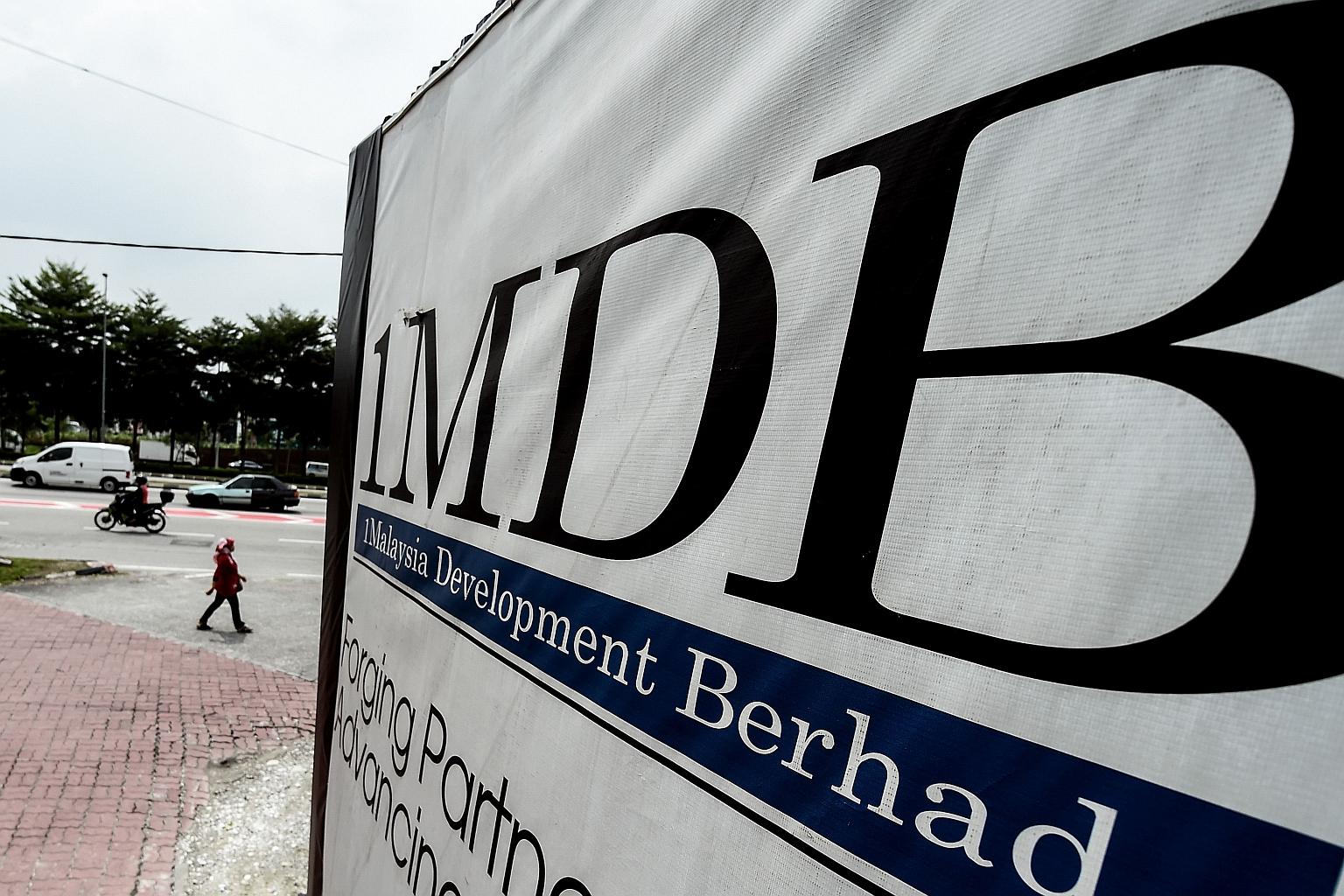1MDB default deters funds as Malaysia can't put scandal to bed
Sign up now: Get ST's newsletters delivered to your inbox

A woman walking past a billboard with the 1MDB logo at the funds flagship Tun Razak Exchange construction site in Kuala Lumpur, on Sept 22, 2015.
PHOTO: AFP
HONG KONG (BLOOMBERG) - As Malaysia's state-owned investment company reaches out to bondholders to explain why it has defaulted, some investors say they can't wait to hear the end of the saga.
1Malaysia Development Bhd, which defaulted on dollar- denominated bonds last month and faces another coupon payment on Wednesday (May 11), said it plans a call on May 23 to explain its dispute with a co-guarantor and how it plans to meet future obligations. Returns on debt from Malaysian issuers have cooled amid probes into financial irregularities at 1MDB, whose advisory board has been headed by Prime Minister Najib Razak.
"The political situation in Malaysia continues to be one of the biggest, I would say, hurdles for foreign investors," said Arthur Lau, co-head of emerging-market fixed income in Hong Kong at PineBridge Investments, which manages about US$83 billion globally. "In terms of fundamentals everything points to be quite OK, especially now with oil prices rebounding. The only one thing that really drags is the political noise."
The ringgit has slumped 2.8 per cent this quarter, turning to Asia's worst performer from its best in the first quarter. The cost of insuring the nation's sovereign debt against default has risen 10 basis points since March 31 to 163. Malaysia's corporate dollar bonds returned 1.1 per cent in the period, slipping to seventh place from third place in the first three months, based on Bank of America Merrill Lynch indexes.
Sariffuddin Tengku Ahmad, the prime minister's press secretary, didn't immediately respond to an e-mail seeking comment.
Dollar bonds from Malaysian issuers are underperforming even as this quarter's 20 per cent crude rally brightens the outlook for the net oil exporter. While the finance ministry announced last week that 1MDB's board will resign on May 31, previous efforts to draw a line under the scandal have failed. The fund announced plans last year to unwind assets.
"Headlines about 1MDB that keep coming back would probably be kind of a dampener and may give investors less reason to focus on the fundamentals," said Euben Paracuelles, a Singapore- based economist at Nomura Holdings Inc. "It's very hard for investors, given their experience last year, to kind of put it to bed."
The fund didn't meet a US$50 million coupon payment last month amid a dispute with co-guarantor Abu Dhabi's International Petroleum Investment Co, which triggered cross defaults on RM7.4 billion (S$2.5 billion) of 1MDB debt. The company is due to pay another US$52.4 million of interest on Wednesday on its 5.99 per cent notes maturing in 2022, according to calculations based on Bloomberg data.
"1MDB will now actively engage with all holders in order to outline the next steps of the process," the company said in a statement Monday. It is also asking investors to hold off any request for early repayment on its Islamic debt, a person familiar with the matter said last week. 1MDB's spokesman couldn't be reached for comment by phone and e-mail.
Pheona Tsang, head of fixed income at BEA Union Investment Management Ltd, which manages US$6.8 billion, said that the ringgit has already priced in "a lot of political risk" and she is waiting for a further pullback to buy more. Christian de Guzman, senior analyst at Moody's Investors Service, said that Malaysia is buffeted by the same shocks as other countries and all things considered, seems to be doing "somewhat alright."
The default is the latest episode in financial scandals that have rocked 1MDB, already the target of investigations in Switzerland, the US and Singapore into allegations ranging from money laundering to embezzlement. Both 1MDB and the premier have consistently denied wrongdoing.
AllianceBernstein has been underweight on Malaysia for "a while" and has a bearish view, said Jenny Zeng, Hong Kong-based portfolio manager for Asian credit, which manages about US$479 billion.
"The 1MDB default is highlighting the risks of contingent liabilities on the sovereign," she said. "If I look at Malaysia's banking system and the sovereign, it's on a gradually deteriorating trend."


